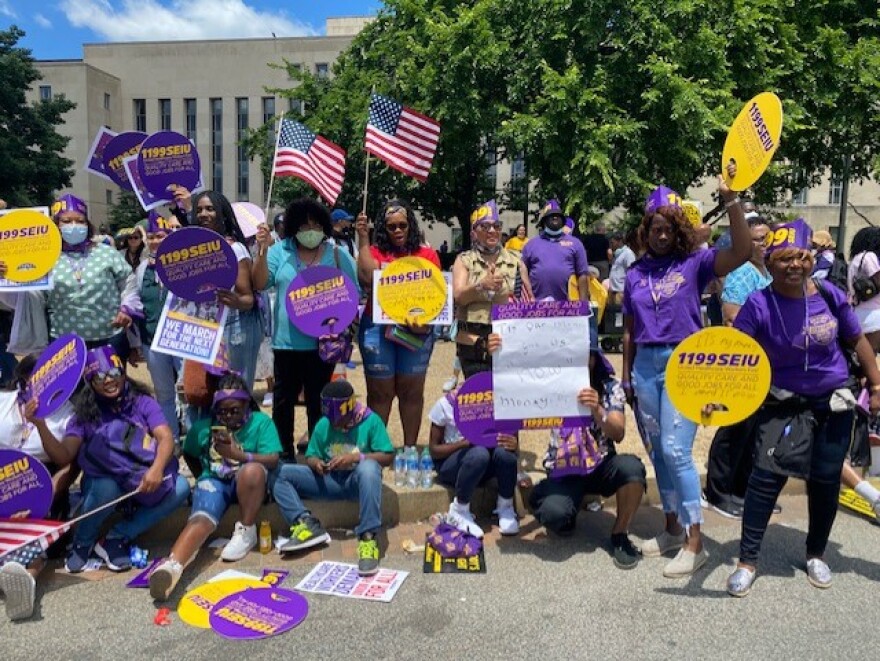DOUG DOYLE: We have heard a lot about the push for more unions lately. That was certainly highlighted last Saturday. Union activists, their families and supporters, including busloads from New Jersey came by the thousands to the nation's capital to participate in the Poor People's Campaign's call for a moral march on Washington. WBGO’s Bob Hennelly has this reporters notebook.
HENNELLY: More than a half century after Dr. Martin Luther King called for the first Poor People’s Campaign and March Rev. Dr. William Barber, the campaign’s co-chair welcomed the large crowd that amassed just outside the nation’s Capitol building, where back on Jan. 6, 2021 a violent insurrection raged.
BARBER: “A hundred thousand people are on these streets and on the way. Buses are on the way. Millions have joined us on line. Pamela is not here. She died because of poverty and the denial of healthcare and COVID. But today we are joined by these young people who promised that no matter what happens to us, they will not let this movement go.
HENNELLY: For five hours march attendees heard speakers address the unmeet needs of the nation’s 140 million low wealth and low wage people, roughly 43 percent of the population, including 52 percent of the country’s children. Dozens of union activists, environmental advocates, and social justice activists took their turn addressing the large crowd that extended for blocks.

Nikki Taylor is a Starbuck’s union organizer from Memphis Tennessee.
TAYLOR: "With Starbucks' billions, Starbucks workers should not be poor people. … Most of us are making under $15 an hour and that is not a living wage. So, therefore we chose to organize and that’s reason number one why we chose to organize. We are working under unsafe conditions working with no protection between people throwing drinks at us, throwing punches at us, calling us names— and that’s why we organize. It takes a Starbucks barista almost 30 years to make what our CEO makes in a year and to me that is ridiculous and that is why we organize.
HENNELLY: Before the march was underway I asked Rev. William Barber to explain the role that he believes younger people are now playing in the 21st century’s social justice movement.
BARBER: “Dollar General young folks—Starbucks folks, all of them will be here today. Because at the end of the day, the same people fighting young people who are fighting for a woman’s right to choose, fighting for a living wage, fighting for health care are the same people. If they are cynical enough to be together—we have to be smart enough, courageous enough and strategic enough to come together—stand together and change this country together.”
HENNELLY: Rev. Bernice King, an attorney and the youngest child of Rev. King and Corretta Scott King is now the CEO of the King Center. She told me she was inspired by the work of New Jersey resident Chris Smalls, who recently led the efforts to establish the first Amazon warehouse union on Staten Island.
BERNICE KING: "We are in a season of great sacrifice, and we have been in this kind of period of time when people have not understood that Daddy and them had to put a lot stuff on the line, and that's where we are now. So wherever these young people are when they organize, they mobilize, they strategize — they can plan.”

HENNELLY: Dr. Cornel West, now at the Union Theological Seminary, told me he also found inspiration in the revival of the labor movement that’s increasingly led by young people.
CORNEL WEST: We are here for the precious every day people especially the young people, the Chris Smalls and others are truth tellers and justice seekers. That’s what the Poor People’s Campaign is all about, it is the legacy of Fanny Lou Hamer and Martin Luther King Jr. and we are still swinging with the people.”
HENNELLY: Back in April, the Poor People's Campaign released the first-of-its-kind comprehensive study of COVID deaths in more than 3,000 U.S. counties that plugged in the poverty, income, race and geography data points. What the data revealed was that residents of poorer neighborhoods were anywhere between two to five times more likely to die than people living in wealthier counties.

The Poor People’s Campaign has launched a voter mobilization effort to coincide with this November’s Congressional election. In 2020 poor and low wealth voters represented 35 percent of the electorate with millions more on the sidelines.
Mary Kay Henry, is president of the Service Employees International Union.
MARY KAY HENRY "Working people understand we have to raise the stakes [this election] because the stakes are getting raised on us by denying voting rights, by denying abortion rights and health care and denying us the ability to join together in unions."
HENNELLY: Rev. Barber and the Poor People’s Campaign have asked President Biden to meet with a delegation of low wealth and low wage Americans at the White House in hopes of refocusing this years campaign on their issues. In Washington for the WBGO Journal I am Bob Hennelly



